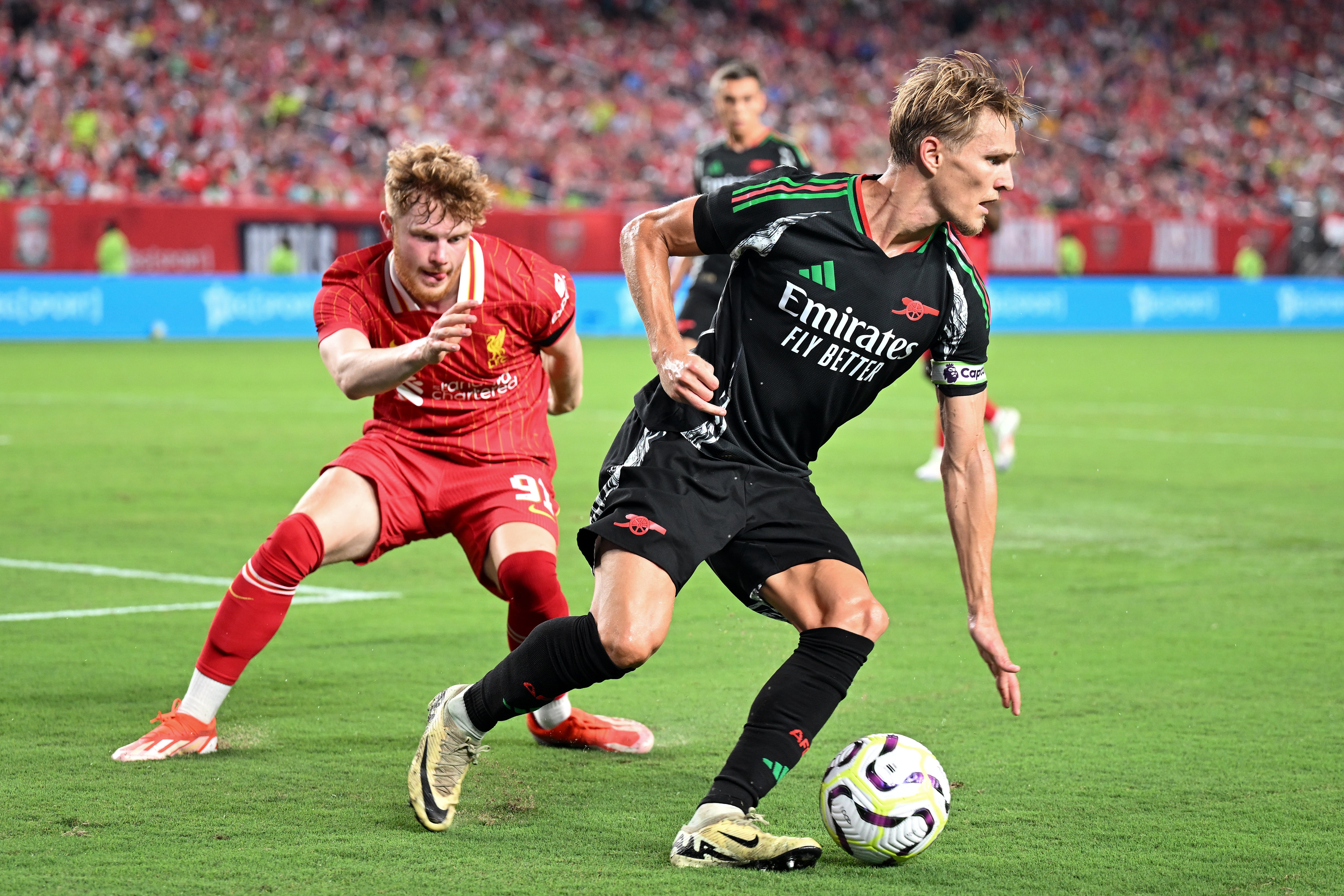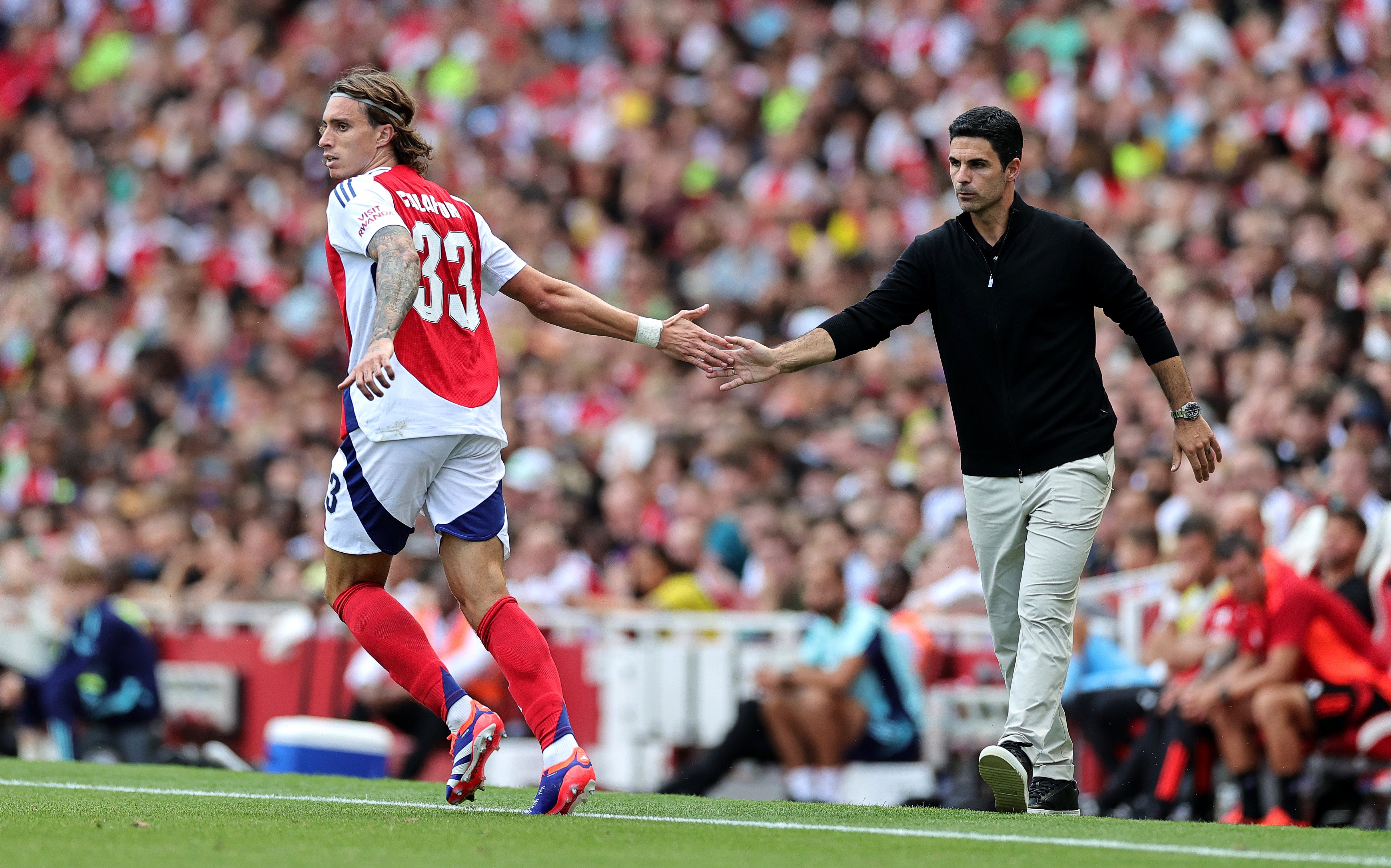It’s time for Arsenal to deliver – and one uncomfortable question holds the key
After £650m spent on new signings, the Gunners have won a single FA Cup. Can Mikel Arteta deliver the prizes which matter most?

Gradual progress, incremental improvement. Arsenal have been on a serious upward trajectory over the past few seasons, and now there’s only one place left to go. Of course, that final step is always the most difficult, yet it is also the end ambition, the goal, the whole point of a new direction, new investment and new reason for optimism.
Mikel Arteta – like most bosses who go up against Pep Guardiola-led teams – remains unproven in that most important context. If last year was about showcasing they could stay the course and be in a genuine title fight into the final week or two of the season, then 2024/25 must be about underlining the reasons why Arsenal can take the final step – and, of course, about actually taking it.
Two points off the title as they were last year feels close, and yet... it never feels that close to Manchester City, somehow. This is after all a team who have twice won the league recently by single-point margins, have hit record tallies along the way and have become experts in seeing out the season.
If you’re behind them by a point, or four, with seven or eight games to go and win the rest of your matches... you probably finish a point, or four, behind them. To win the English title, rivals have two options: be damn near perfect, or wait for City’s fairly minor slip-ups and be ready and in place to have a merely exceptional season themselves.
Let’s put that into context for Arsenal. The Gunners were largely very good last year, won 28 of 38 games and claimed 89 points. It wasn’t their best-ever season: their record points haul for a single top-flight season is 90. They achieved that over two decades ago, in 2003/2004.
Had they managed to equal that for the past eight years in a row, including last season – so adding another point to their tally and being consistently as good as the best, brief peak they’ve ever had – they would still have claimed only two more Premier League titles: Covid-restricted 20/21 by four points and 22/23 by a single one. Given City won the latter at a canter and took only one point from the final six after the league was sewn up, it’s probably fair to suggest 90 wouldn’t have been enough then either, had that scenario actually unfolded.
Equally notable is that 90 points wouldn’t have even seen a team finish as runners-up on two occasions in that timeframe. The goalposts have very much been moved, from needing to be excellent to needing to be elite.

For Arsenal, that means they need to have a historic season just to be in the conversation at this point.
Yet it’s arguable that Arsenal have been active enough in improving the team over the past half-decade for that to be the expectation at this point.
Five full seasons should be yielding significant success, not just growth. Arteta, the manager-not-head-coach, cannot suggest he hasn’t had the backing.
Since the start of 2020/21 – so Arteta’s first full season as boss, following five football months plus the Covid gap in charge – Arsenal have reportedly spent around £650m on new signings. As the club have long been at pains to point out, he’s heavily involved in the decisions of who and how much, when it comes to additions.

They’ve recouped somewhere around £152m in the same timeframe – four full campaigns and this ongoing summer transfer window – including loan fees, judging by the same source in terms of valuations. Even if there are discrepancies along the way in how much was actually paid or received for any particular player, the numbers are fairly enormous: around half a billion spent, net.
The return on that so far is one FA Cup.
It was won in front of no fans, too, before all that spending started – the delayed 2020 FA Cup final. In other words, with Unai Emery’s team.
While it is absolutely undeniable that the Gunners have improved, are in a much better place with squad depth, have brought long-term quality players to the side and have a clear potential team for the next three or four years, it’s equally true that after such rebuilding – in time as well as financial terms – the club will be, must be, expecting a more significant return.
The Premier League title and the Champions League trophy are the ones that matter, of course. They are also extremely difficult to win.
Consider: if Man City have an average season for themselves in points terms, that’s 91 – a new Arsenal best, remember – just to match them. Yes, last season was merely average for that side: 638 points won over the last seven years, averaging out to 91.1 each term. We often hear managers or players speak in cliches about “adding five per cent” to their game; if Man City add a single victory to their 24/25 tally, Arsenal will literally need to be seven per cent better across the board than they were last season.
All of that begs the uncomfortable question of whether the current manager is the one who can do so.
And that’s an important consideration heading into this term in particular.

Given Man City are unlikely to implode by any significant margin, and that Arsenal have not added with regards to match-winners in the off-season, improvement on their part will need to come from increased or improved coaching, cohesion, familiarity.
It means Arteta – and his staff – need to find the gains, the percentages of improvement, to go yet another step beyond their recent best, and into all-time territory: either way beyond the 90-point marker, or becoming champions of Europe. Neither are easy things to achieve. They are not supposed to be.
But it’s time for this manager, with the squad he has built, to prove he is the one capable of at long last doing so.
Join our commenting forum
Join thought-provoking conversations, follow other Independent readers and see their replies
Comments


Bookmark popover
Removed from bookmarks